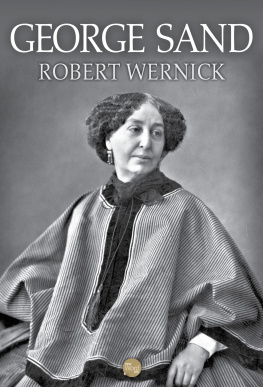If you had a time machine and could travel back 200 years to the center of any great city London or New York or Paris - you would be struck by the scarcity of women. Other than a cleaning woman or a prostitute or two, all the people would be men - soldiers, government officials, merchants, lawyers, priests, coachmen, porters, lackeys, poets - all scurrying about as they made the world go round while women were out of sight at home sewing and cooking and having babies.
It took decades for changes in individual attitudes and actions to produce todays street scenes, and an exact chronology is not possible. But for women, the first step forward into the modern world happened one afternoon in November 1830 at the Nohant chteau in France, home to writer George Sand.
In 1830, Sand was still Aurore Dupin, Marquise de Dudevant, twenty-six, handsome, hot-blooded, and thoroughly unhappy. With her husband, Casimir Franois Dudevant, and their two small children, she was living on the estate inherited from her grandmother. Rummaging through her husbands desk in search of some papers, she came across a bulky envelope with her name on it and the words, ONLY TO BE OPENED AFTER MY DEATH. Since it was addressed to her, she opened it and read about all the resentments and disapprovals that had been brewing for eight years of a marriage between two people who had nothing in common except a love for riding horses.
The harsh words snapped something inside of her, and all the ideas that had been simmering in her head for years boiled over. She immediately summoned her husband and told him she was tired of living with a drunken oaf who fell asleep when she talked about books or played the piano and that she was moving to Paris to write books and live her own life - and furthermore, he could take care of the house and the children. She needed his consent to do so, for though the property and most of the money belonged to her, the legal wisdom handed down for thousands of years decreed that a married woman was incapable of handling her own business affairs and all the checks had to be signed by her husband. In fact, since the product of a wifes work was the property of her husband - under a provision of French law not eliminated until 1970 - he had the right to have his name printed on the title page of any book she might write. This particular husband was a great hunter and a heavy drinker, but he was no match for her in character, and she bullied him into accepting her terms and giving her a small allowance when she went off to Paris. In his dull, confused way, he knew something unusual was going on, but he had no idea he was helping to inaugurate a new era in human history.
Within a couple of months, the baroness had packed her bags, kissed her children goodbye, and headed for Paris, where she attracted immediate attention by wearing pants, a sight no Parisian had ever seen on a woman outdoors. Within a few weeks, she began selling articles and short stories to newspapers and had become an active member of a hitherto all-male circle of talkative, turbulent students and artists. She was living in rooms overlooking the river with a curly-haired young man named Jules Sandeau, whom she had met at a party the previous year. He was also a writer, and they collaborated on two novels that were snapped up by a publisher. The public would not take a book seriously if it bore a womans name, so they concocted a joint asexual pseudonym, J. Sand. When she realized her little Jules was lazy and she was doing most of the work, she decided to strike out on her own and produced the remarkable novel, Indiana. It is the story of a beautiful young bride married to a dull brute, wooed by a cynical cad to whom she is willing to sacrifice all if he will sacrifice all to her, but he prefers to make a safe and profitable marriage, so she jumps off a cliff. Her heroine Indiana was, said Sand, Choice at war with Necessity; she is Love blindly butting its head against all the obstacles set in its way by civilization.
Once again, the publisher refused to use a womans name on the title page and suggested they might lure all the J. Sand fans into buying the book by changing a single letter. So the authors name became G. Sand, and the G, she decided, would stand for George. It was the name by which she was to be known forevermore.
Indiana was an instant success. She wrote another novel and then another.
But that was only the beginning of her aspirations.
The pants she wore were primarily a matter of practical convenience: No one could work in newspaper offices or run around with all the bright young writers and artists or even sit in the orchestra at theaters if hobbled by ballooning skirts. Like the cigars she smoked, her pants were also a signal of revolt; they announced her intention to turn law and society and traditional modes of thought upside down and put an end to the age-old tyranny of men over women. She was going to live like a man, make money like a man, and have love affairs the way every famous man from Saint Augustine to Lord Byron had done, without giving up any traditional feminine features. She would still be a good cook and housekeeper, managing a dozen servants and a 300-acre estate. She would be a good mother and be flighty and flirty, letting emotion run her life when the right lover came along. She would be completely honest and independent: I ask the support of no one, neither to kill someone for me, gather a bouquet for me, correct a proof, or to go with me to the theater. I go there on my own as a man, by choice; and when I want flowers, I go on foot, by myself, to the Alps. After all the millennia of female servitude, she would be Spartacus leading the way to freedom.
She was not as radical as she sounded to the horrified conservatives of her day. She did not propose to do away with marriage; she only wanted the wife to have equal rights with the husband. She wanted marriage to stop being a business arrangement between families and become a loving union between two human beings. A child of the Romantic Age, she had high standards for love, maintaining that life should be ruled by emotion and instinct, the heart rather than the brain. She would follow her heart anywhere, but the love she dreamed of, the only love she would tolerate, had to involve a complete accord of heart, body, and mind - complete effusion, embrace of twin souls. Such accords and embraces were hard to come by, and her love life was marked by disappoint, disillusion, and despair. So was her political life, where her hatred of oppression and poverty led her to join revolutionary causes with boundless enthusiasm, only to find that when her heroes came to power, after years of shouting for the people, they soon began to think only of themselves.
Underneath her romantic impulses was a bedrock of common sense. While other Romantics like Lord Byron and Alfred de Musset found no alternative to unattainable ideals but random sex, steady drinking, and early death, she examined her ideals coolly; if finding them wanting, she went on to something else. But she never lost faith that the future was brighter than the past and that the future meant freedom. My profession, she said, is to be free.
A proposal to live by this code was amazing enough coming from a somnolent backwater in the hidebound society of King Louis Philippes France. Still more amazing was that she got away with it. By the time she died in 1876 at the age of seventy-two, surrounded by grieving and adoring grandchildren and local villagers, she was universally recognized (and extolled, worshiped, denounced, and derided) as one of the giant figures of the nineteenth century, and today, she still counts as one of the classic writers of France. Though only a handful of the millions of women now breaking through the innumerable glass ceilings of government and business and manly sports have any idea of the various political and religious causes she espoused, many of them are at least vaguely aware that she took the first step for them all.
Next page














